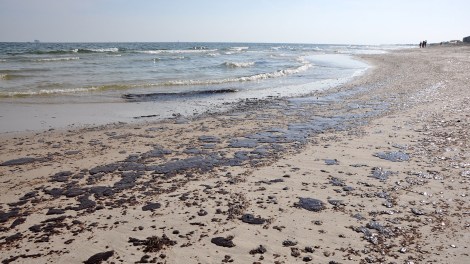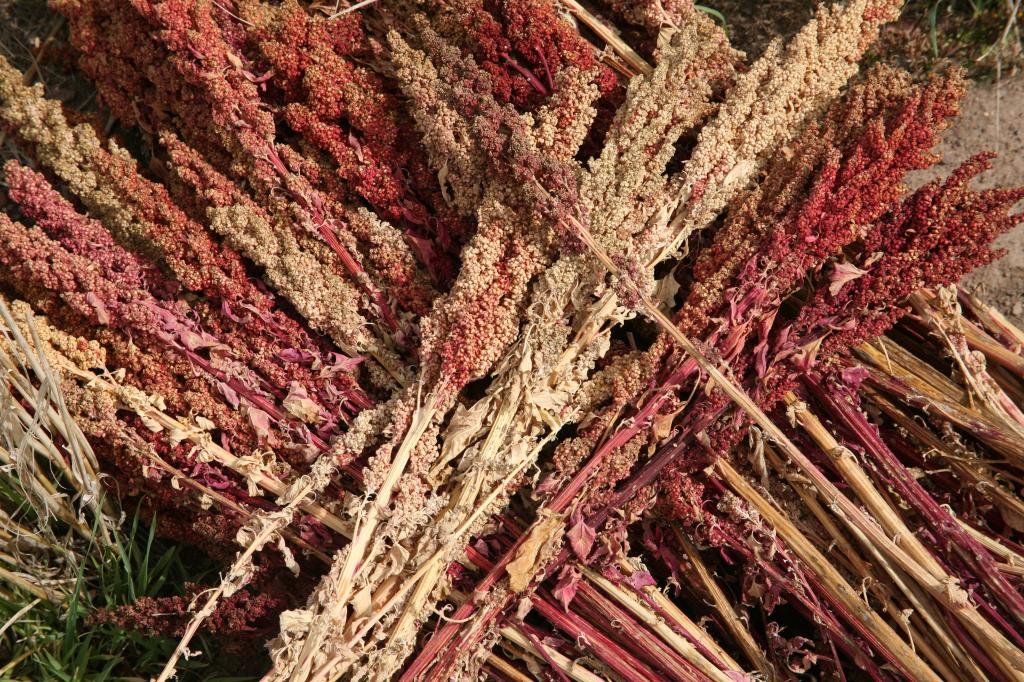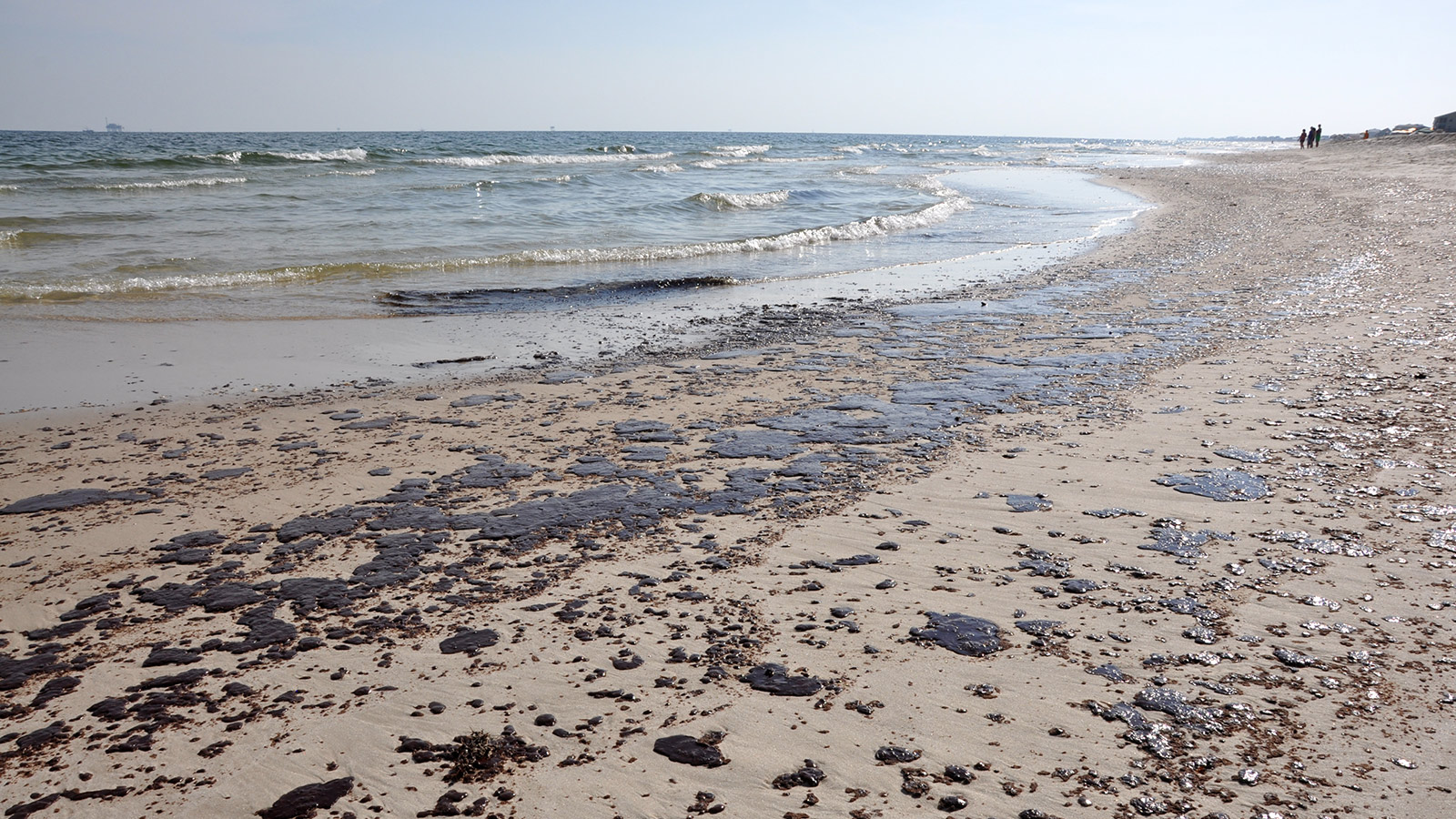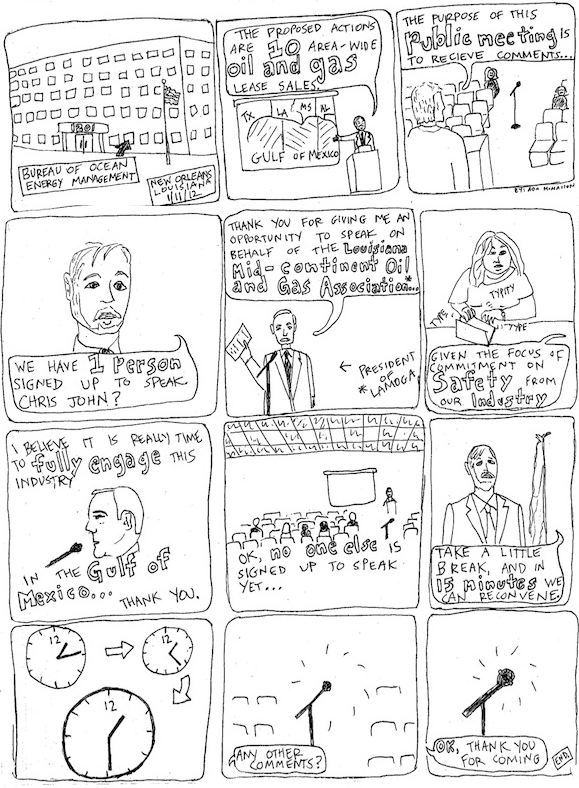
Danny E HooksThe oil-spattered Gulf Coast in 2010. How’s it faring now?
On the fourth anniversary of the BP Deepwater Horizon disaster, the big question is whether the oil spill recovery is finally over. According to BP, yes it is. Or at least BP is wrapping up “active cleanup” and headed home to get its life back, only further available if the Coast Guard calls it.
But to many of the people living along the Gulf Coast, who still have to endure the aftereffects of BP’s blunder, hell naw it ain’t over. Given the tarballs and the oil that’s still drawing a ring of eyeliner along the coast, not to mention all the devastated dolphins and oysters, it’s an insult to even suggest it.
“Today should not have to be about reminding the nation that thousands of Gulf Coast residents continue to be impacted by the environmental and economic damage created by the BP oil disaster,” said Colette Pichon Battle, executive director of the Gulf Coast Center for Law and Policy. “The request by coastal residents four years later is the same as in 2010. Clean up the oil. Pay for the damage. And ensure that this never happens again.”
There are hundreds of unresolved issues on the Gulf Coast, many of them predating the oil spill. With stories spilling in from all over the place, it’s going to be tough sussing out the true grit from the bullshit. Fortunately the good folks over at the Bridge the Gulf blog got you covered.
The blog was created in response to the BP oil spill by Gulf Coast residents and activists who have a direct stake in their communities’ recovery. Many of them have struggled under prior Gulf disasters, like hurricanes Katrina, Rita, Ike, Gustav, and the most recent, Isaac. It’s where you can read about Turkey Creek, Miss., the historically troubled black community that’s the subject of the new documentary Come Hell or High Water. It’s also where you can read about a bunch of other places across the Gulf that have been pricked by storms of both the political and ecological variety.
Disclaimer: I served as an editor of the blog in 2012, so I’m biased. But as someone who’s a relentless consumer of news from media sources across the Gulf — and who’s written for many of them — I can assure you that you won’t find a grander assembly of authentic voices and primary sources from the Gulf anywhere else on the web. Among the Bridge the Gulf writer corps are people like Kindra Arnesen, who was a first responder when the BP rig initially broke, and also voices from the Gulf’s top community organizations like Gulf Restoration Network, t.e.j.a.s., Women With a Vision, and the New Orleans-based Advocates for Environmental Human Rights.
Bridge the Gulf just relaunched with a new website design, but with the same strong repertoire of Gulf renewal narratives. Below are a few examples of blog’s best content over the years:
“On the Road With Cherri Foytlin”: You may have read about Foytlin in Rolling Stone, where she was named as one of “The New Green Heroes” of the fossil fuel resistance — she’s the “Angry Mom.” She walked from New Orleans to Washington, D.C., to raise awareness about health problems along the Gulf believed to be the result of the BP oil spill. She’s been a contributor to Bridge the Gulf since the beginning, as a writer, photographer, and videographer, but here is a rare glimpse of her in front of the camera.
“Gulf Coast Residents Appalled by Lack of Concern for Safety After EPA Drops BP’s Ban on Federal Contracts”: The whole BP Deepwater Horizon saga is summarized in this nugget from long-time Bridge the Gulf contributor Karen Savage: “The EPA banned BP from obtaining new federal contracts and oil leases from November 2012 until the ban was lifted on March 16th. Last year, the oil giant pled guilty to illegal conduct leading to and following the 2010 Deepwater Horizon disaster, including 11 counts of felony manslaughter, one count of felony obstruction of US Congress and violations of both the Clean Water Act and Migratory Bird Treaty Acts. Through their guilty plea, BP admitted to obstructing an inquiry by the US Congress, providing ‘false and misleading’ information regarding flow rate and manipulating internal flow-rate estimates.” On Friday, the Public Citizen, Greenpeace, Friends of the Earth, and dozens of other environmental groups demanded that EPA against suspend BP from receiving for federal leases and contracts.
“What you missed last week at the BOEM …”: People want to know what the federal government has been doing since the BP oil spill to tighten safety regulations around offshore drilling — especially since it has allowed BP back out to drill in the Gulf. Those safety questions have been handled by the Bureau of Ocean Energy Management mainly through a series of nauseatingly boring public meetings. Fortunately, Bridge the Gulf editor Ada McMahon made it unboring for us by attending one and then reporting back in the form of a comic strip:




